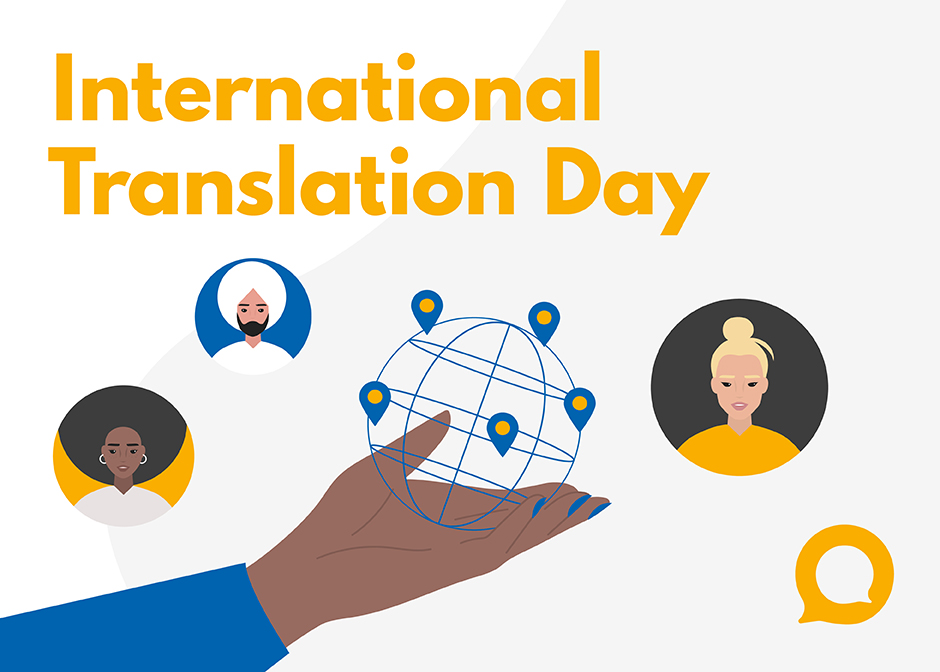‘United in Translation’

23 Sep 2021
Here at Intonation, we recognise and celebrate our translators every day.
International Translation Day simply gives us an extra special reason to reflect on the extraordinary skills and valuable service provided by our language specialists to clients across the world.
The theme of this year’s International Translation Day ‘United in Translation’ is particularly poignant after more than a year of COVID-19 keeping people apart.
Here, we chat to a few of our translators so we can unite in learning more about some of the team’s experiences ahead of September 30th.
How did you get into translation?
Gilla says: “What led me into the translation world in the first place was encountering the work of poet Federico García Lorca when I was 15. That took me to Spain, and it’s the reason I also call myself a poet today.”
Cecilia says: “I got into this field by ‘accident’. I did a BA in language and management studies and absolutely hated the 8h of translation studies I had per week. I was just not getting it. Then I met my British husband in Germany… and spent the first six months of our relationship with a dictionary on my lap!
“After he proposed I moved to England … head office asked me to help with a translation and it was a lightbulb moment for me.”
Petra says: “I’ve always loved languages, but chose to study something entirely different … first studied for lab technician (Biotechnology). Then went on to uni to study Biochemistry… I took a four-month course in programming and worked for Ericsson Telecommunication for four years, which I really enjoyed. Then I quit the job when my oldest son was born. Decided to look for work that I could do from home and somehow got back to my first love of languages and combined it with my knowledge of science to get my first translation jobs as a patent translator and also started translating articles for a popular scientific magazine.”
What’s the best thing about your job?
Gilla says: “What I love most about translation is that you learn something new with each text, especially in my preferred fields of history, art and architecture. I like the research involved as much as anything.”
Cecilia says: “The best thing about my job is the flexibility. I’m a mum of four young children but still somehow manage to pull the hours and work around our family schedule; earning an income which is significantly higher than any other part time job I would have got elsewhere. Plus I do something I absolutely love, translating.”
Petra says: “The best thing about my job is that there is a lot of variation in the work that I’m doing and I am learning all the time while translating. And being a freelancer gives me a lot of flexibility and freedom – I can decide my own hours, there was always somebody at home when the kids were younger.”
Tell us about a rewarding project you’ve worked on:
Petra says: “Ohhhh there are several, I can’t possibly name only one. I have translated audio-guides for bus tours on Malta, from which I learnt a lot about its rich history. I once translated the script of a series for children and bought it on DVD when it was released, and my own sons watched it and thought it was pretty cool that my name was shown in the end! Another job I quite liked was the translation of a children’s book about the ancient Greeks which I found later in the school of my youngest son when they had a project about the ancient Greeks. Oh, and once I translated educational texts for the European Space Agency, for young students, I think it was linked to a mission on the ISS, I don’t remember exactly, but it was really interesting!”
Gilla says: “One of the most interesting projects I have ever been involved in is the Discover Islamic Art virtual museum created by Museums With No Frontiers in the late 1990s and early 2000s in which 17 museums across the world worked in collaboration and for which I translated the descriptions of Moorish buildings and art from Portugal. We even had a live launch of the virtual museum at The British Museum so all the collaborators, including us shy and retiring translators, could come away from our remote hideaways and meet up. It was a time of breaking down cultural barriers and borders, and a time of optimism. It’s all still available online and is fascinating. And it epitomises what for me the cultural sharing that translation is all about.
“A more recent collaborative project took place last year during lockdown when 46 Portuguese-speaking writers wrote a chapter each of a pandemic-related novel, releasing a chapter online each day, closely followed by each chapter translated into English by 46 different translators. 46 artists also took part. A bilingual physical book was subsequently published Bode Inspiratório/Escape Goat and various videos and translations into other languages have followed.”
So why is translation so important?
Petra says: “Translation is important because it makes it possible to share books, thoughts, ideas, movies etc. with people all over the world.”
As Gilla mentioned, translation is about cultural sharing.
Translation gives us access to whole cultures, teachings, markets and resources that we wouldn’t otherwise be able to understand. The freedom to learn and to share.
And on International Translation Day, more than ever, that’s certainly worthy of celebration!
Contact us if we can help with any translation or transcription services, today or any day.